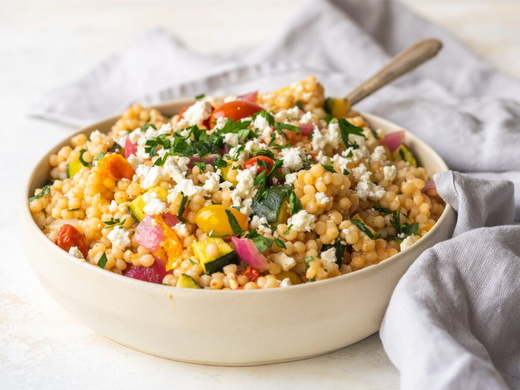Couscous, with its tiny, bead-like appearance, is a staple popular in many cuisines around the world. But for those with gluten sensitivities or coeliac disease, its gluten content poses a crucial question: Is couscous gluten-free? In this article, we discuss couscous, its gluten status, explore gluten-free alternatives, and provide essential information for a safe and enjoyable culinary journey.
What is Couscous?
Couscous is a type of small, granular pasta made from crushed and steamed wheat or barley. It is a staple food in North African and Middle Eastern cuisines, where it has been consumed for centuries. Couscous has gained popularity worldwide due to its quick cooking time and versatility in various dishes.
Nutritional Profile of Couscous
Here's an overview of the nutritional content of cooked couscous (per 100 grams):
● Calories: Approximately 112 calories
● Carbohydrates: About 23.2 grams, primarily in the form of complex carbohydrates. Couscous provides a good source of energy.
● Protein: approximately 3.8 grams. While couscous is not exceptionally high in protein, it does contribute to your daily protein intake.
● Dietary Fibre: Around 1.4 grams, which is relatively low compared to whole grains like brown rice or quinoa. However, it still contributes to digestive health.
● Fat: Couscous is very low in fat, with less than 1 gram per 100 grams, making it a low-fat option.

Health Benefits of Couscous
Couscous offers a range of health benefits, making it a nutritious addition to your diet when consumed as part of a balanced meal. Here are some of the health benefits of couscous:
Good Source of Energy
Couscous is rich in complex carbohydrates, which provide a steady and sustained source of energy. It can help fuel your body throughout the day and support physical activity.
Low in Fat
Couscous is naturally low in fat, making it a hearthealthy option when combined with a diet low in saturated and trans fats.
Protein Content
While not as high in protein as some other grains, couscous still contains a moderate amount of protein. Combined with other protein sources, it can contribute to your daily protein intake.
Rich in B Vitamins
Couscous is a good source of several B vitamins, including thiamine (B1) and riboflavin (B2). These vitamins are essential for energy metabolism and overall well-being.
Provides Essential Minerals
Couscous contains minerals like magnesium and phosphorus, which are important for bone health, muscle function, and cell metabolism.
Selenium
Couscous provides selenium, an antioxidant mineral that helps protect cells from oxidative damage and supports the immune system.
Low Sodium
Couscous is naturally low in sodium, which can be beneficial for individuals looking to reduce their sodium intake to manage blood pressure.
So, is couscous gluten-free?
No, couscous is not gluten-free. Traditional couscous is made from crushed and steamed wheat or barley, both of which contain gluten proteins. Gluten is a protein composite found in various grains, and it is known to cause issues for individuals with coeliac disease, wheat allergies, or gluten sensitivities.

Gluten-Free Couscous Alternative
Individuals who need to avoid gluten need to choose gluten-free alternatives. Fortunately, there are gluten-free couscous options available on the market made from alternative grains like corn, rice, or millet. Here at Niyis, we have a great alternative to the traditional wheat couscous, which is our cassava couscous that has zero gluten content.
Potential Side effects of eating Couscous that contains Gluten
Consuming couscous that contains gluten can have potential side effects for individuals who are sensitive or intolerant to gluten. Here are some common side effects associated with eating couscous that contains gluten:
Digestive Discomfort
The most common side effect is digestive discomfort, which can manifest as bloating, gas, abdominal pain, cramping, and diarrhoea. These symptoms may occur shortly after consuming gluten-containing couscous.
Celiac Disease Symptoms
For individuals with coeliac disease, the consumption of gluten-containing couscous can trigger an autoimmune response that damages the lining of the small intestine. This can lead to a range of symptoms, including diarrhoea, weight loss, fatigue, skin rashes, joint pain, and nutritional deficiencies.
Wheat Allergy Symptoms
Some people may have a wheat allergy, and couscous made from wheat can trigger allergic reactions. Symptoms may include hives, itching, swelling, difficulty breathing, and, in severe cases, anaphylaxis.
Gluten Sensitivity Symptoms
Non-coeliac gluten sensitivity (NCGS) is a condition in which individuals experience symptoms similar to those of coeliac disease when consuming gluten but without the autoimmune response and damage to the intestine seen in coeliac disease. Common NCGS symptoms include digestive discomfort, fatigue, headaches, and brain fog.
Skin Issues
Gluten sensitivity or coeliac disease may manifest in skin problems such as dermatitis herpetiformis, a chronic itchy rash characterised by small, fluid-filled blisters.
The quest to answer the question, "Is couscous gluten-free?" leads us to a clear verdict: Traditional couscous, made from wheat or barley, is not gluten-free. It contains gluten, which can trigger adverse reactions in individuals with coeliac disease, wheat allergies, or gluten sensitivities.
For those who must avoid gluten, the choice is clear—opt for certified gluten-free couscous varieties and explore the world of delicious couscous dishes without any compromise on taste or health.


Share:
Best ways to cook mackerel fish
How to make Nigerian jollof rice